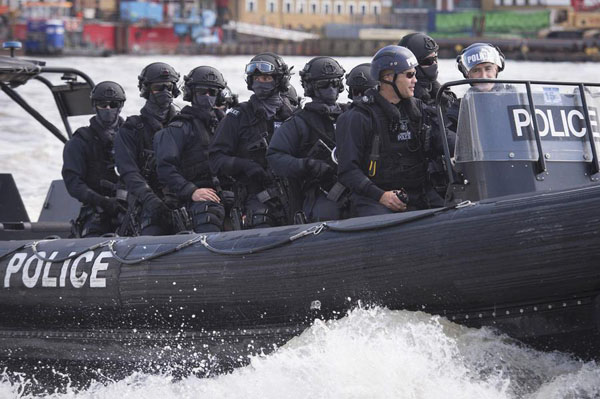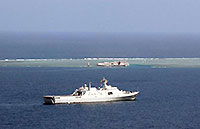Knife-wielding man kills one, injures five as London unveils new anti-terror unit
By Angus McNeice in London (chinadaily.com.cn) Updated: 2016-08-04 18:13
 |
|
Armed Metropolitan Police counter terrorism officers take part in an exercise on the River Thames in London, Britain August 3, 2016. [Photo/Agencies] |
Londoners woke up to a heavier armed police presence on Thursday as officers said they had arrested a 19-year-old man on suspicion of killing a woman and injuring five others in a knife-wielding attack in central London late Wednesday night, on the same day the authorities unveiled the capital's new, heavily armed anti-terror unit.
Police said previously early indications point to mental health as a factor in the attack, though terrorism remains a line of inquiry. But later police said no evidence of radicalization has been found to suggest terrorist motives.
The Met have confirmed the woman killed in last night's attack was from the US.
Assistant commissioner for specialist operations Mark Rowley said the other five injured are from UK, USA, Israel and Australia.
The 19-year-old who has been held on suspicion of murder is "a Norwegian national of Somali origin", Rowley said.
Rowley also said the injured victims "are not in a life threatening condition".
The stabbing came on the same day the Met unveiled a significant addition to its anti-terror unit, in response to the high number of recent attacks elsewhere in Europe. Six hundred heavily armed marksmen — called counter terrorism specialist armed forces (CTSFOs) — have been deployed on London streets.
The new unit, which includes a fast response contingent operating on BMW F800 GS motorbikes, brings the total number of armed police officers in the capital to 2,800. On Sunday, Metropolitan Police Commissioner Sir Bernard Hogan-Howe said a terror attack in the UK is a matter of "when, not if" and said the terrorism threat level in Britain remained at "severe."
Europe is on edge after several attacks in France and Germany in recent months, including a truck-ramming that resulted in 84 deaths in Nice on Bastille Day -- so-called Islamic State claimed responsibility for the attack.
In the UK more than 90 percent of police officers are unarmed, and unlike their counterparts in other parts of the world do not routinely carry pistols.
Each force has a small number of trained uniformed number of officers who carry pistols and semi-automatic weapons to guard key targets such as government offices and railway stations, but Wednesday marked the first time a dedicated heavily armed unit has been introduced.
On Thursday, officers were alerted at 10:33 p.m. to reports of a man attacking people with a knife at London's Russell Square. Six minutes later police used a Taser, or electric stun gun, to subdue the man and arrest him at the scene. He remains in custody.
Paramedics attended to five victims, two women and three men. One woman in her 60s died at the scene and Scotland Yard said the other victims have "various injuries."
"Early indications suggest that mental health is a significant factor in this case and that is one major line of enquiry," Metropolitan Police Assistant Commissioner Mark Rowley said in a statement on Thursday morning. "But of course at this stage we should keep an open mind regarding motive, and consequently terrorism as a motivation remains but one line of enquiry for us to explore."
The Met's homicide command is investigating the attack with support from the counter-terrorism unit. Rowley said Londoners can expect an increased police presence on the streets including armed officers, and London Mayor Sadiq Khan asked the public to remain "calm and vigilant."
"I haven't seen a police presence like that in this area since 7/7," one witness told the BBC. I've been living in this area for 12 years and it brought back that memory because you don't really see that in central London, you don't really see armed officers carrying submachine guns."
Russell Square Underground Station was targeted in the July 7, 2005 London bombings in which Islamic extremists killed 52 and injured more than 700 people.
To contact the reporter: angus@mail.chinadailyuk.com







